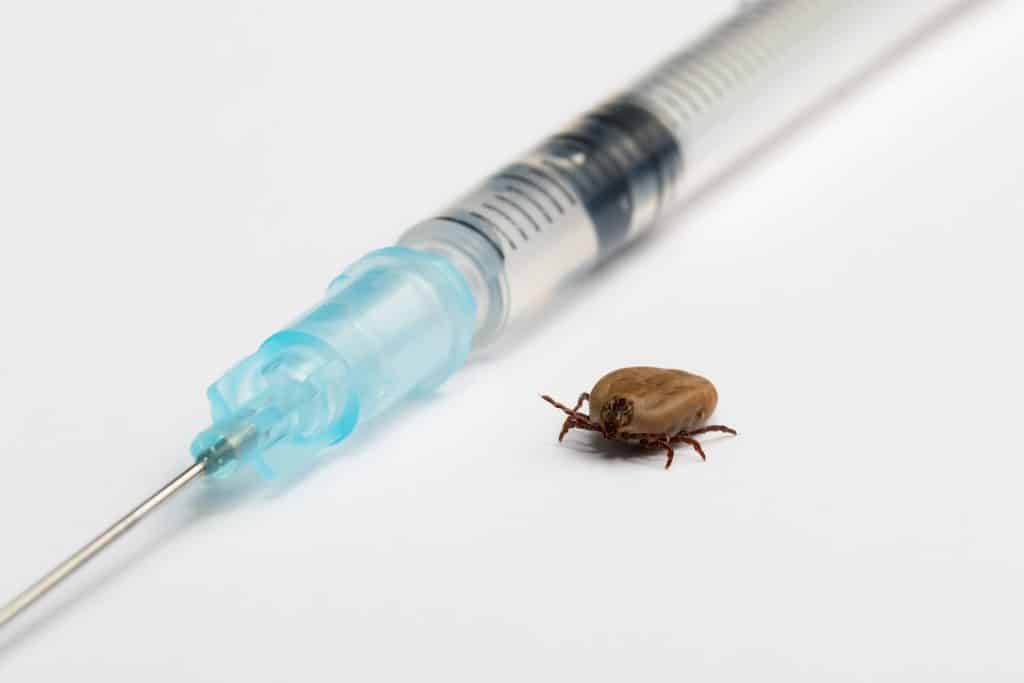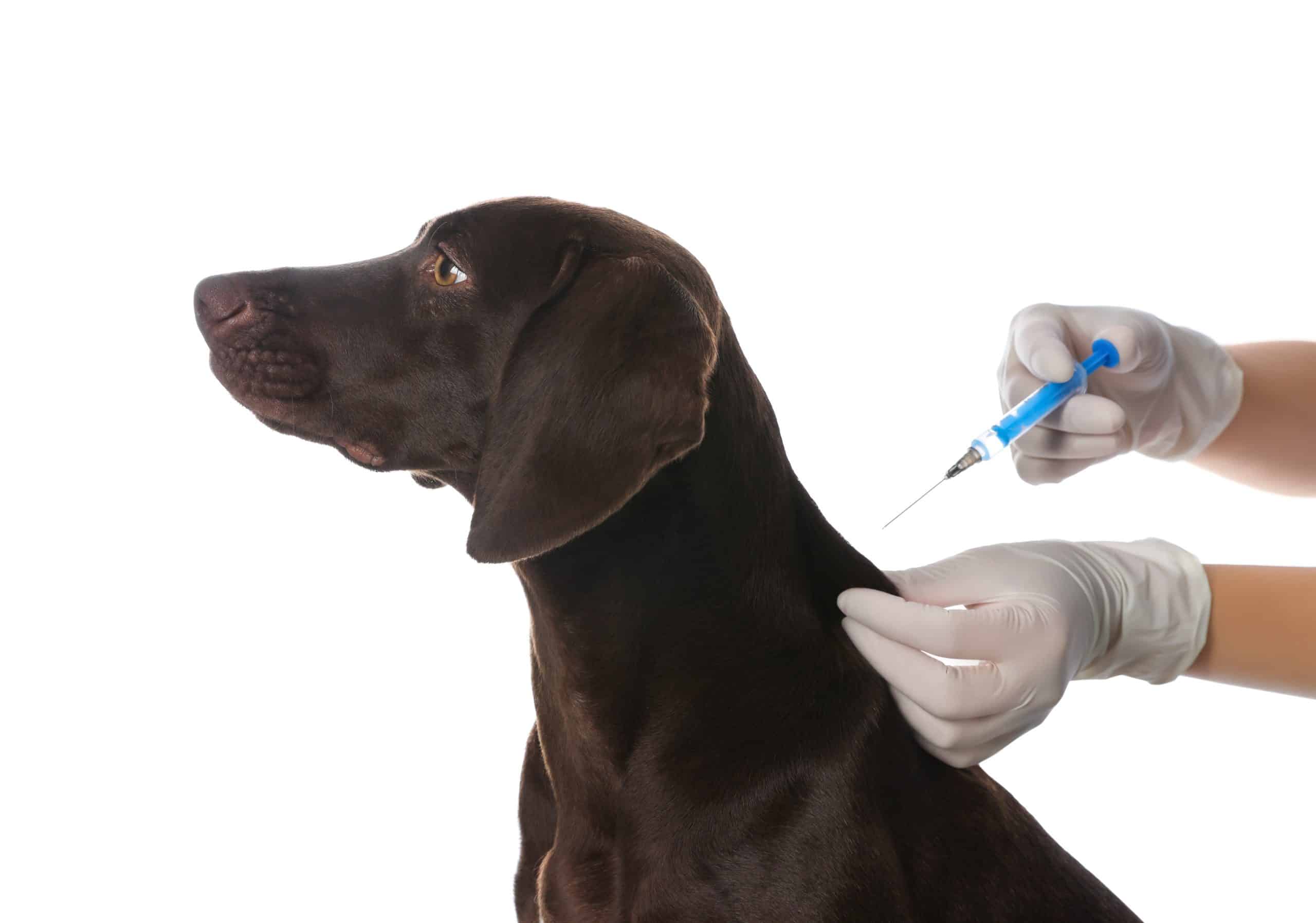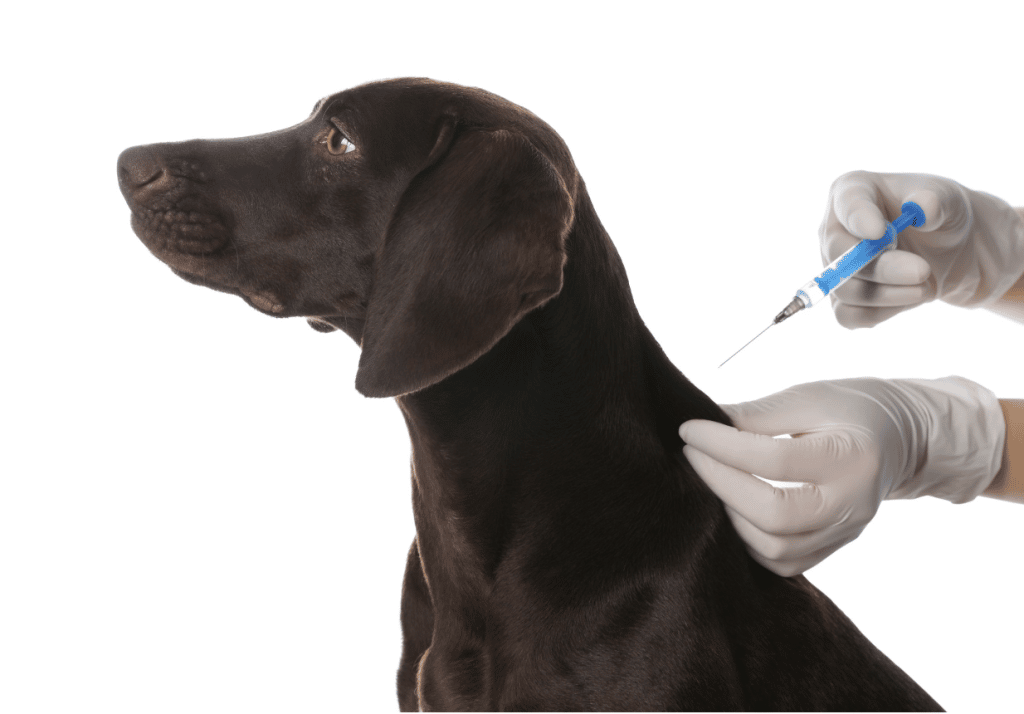Listen to our Podcast Episode on Dog Vaccines with Dr. Ng
Listen to all Love, Dog podcast episodes on your favorite podcast App.
Making the right choice regarding vaccinating your dog can be quite daunting at times. Without a doubt, vaccines have allowed both humans and animals alike to live longer, healthier lives. Now that the general public is better informed about vaccinology thanks to COVID-19, astute dog owners know to derive their pet health decisions from reputable resources. Still, as the landscape of preventive health evolves, especially with regard to vaccines and infectious disease, it’s crucial to determine what’s true, what’s myth, what’s necessary, and what’s not.
Which dog vaccines are absolutely necessary?
Rabies and the “distemper combo” vaccines are considered the two “core” vaccines because they are non-negotiable: every dog should have protection against these diseases. The duration of immunity for rabies is every one to three years, depending on your local municipality (rabiesaware.org). Although most animals will keep lifelong titers against rabies (titers are discussed below), these laws are meant to protect humans.
The “distemper combo” (DA2P) is a triple-threat vaccine that protects against distemper, adenovirus, and parvovirus, which are highly infectious viruses that cause a variety of life-threatening neurologic, respiratory, and gastrointestinal symptoms. After the initial puppy series, revaccination is typically recommended every three years thereafter.
Which dog vaccines are optional?
Vaccinations against leptospirosis, Lyme disease, Bordetella, and canine influenza are all considered lifestyle vaccines that are recommended if your dog has considerable risk and/or exposure to these diseases.
Leptospirosis is a bacteria that is typically transmitted through the urine of wildlife. Dogs that have exposure to the outdoors, especially areas where wildlife and free-standing water are present, should be vaccinated for this zoonotic disease (able to also infect humans) that can result in liver and kidney failure.
Lyme disease, named after its origin in Lyme, Connecticut, is caused by a bacteria named Borrelia burgdorferi that is transmitted through the bite of a deer tick. A variety of symptoms can occur, including lethargy, inappetence, joint pain, and life-threatening kidney failure. While tick prevention is critical in staving off this disease, vaccination is recommended in dogs with high exposure to the outdoors in areas where Lyme is endemic.
Bordetella, also commonly known as “kennel cough,” is just one of the infectious agents implicated in the more accurate term: canine infectious respiratory disease complex (CIRD). The truth is that upper respiratory symptoms of coughing or sneezing can be caused by a number of various viruses and bacteria, often in combination with one another. So although Bordetella is one of the most common bacterial agents, it’s important to recognize that vaccination against this does not protect against the other contagions. However, the Bordetella vaccine is often combined with other viral agents, including parainfluenza and adenovirus. It is recommended in dogs that interact with other dogs—especially at dog parks, boarding facilities, and kennels—and is the one vaccine that is given in the nose or mouth.

A tick after being removed from a dog
Photo: Shutterstock

Photo: Shutterstock
The other lifestyle vaccine that is recommended for dogs that interact with stranger dogs is canine influenza (H3N2 and H3N8). Although this vaccine can be appropriate for any dog receiving the Bordetella vaccine, the true need for it may depend on the prevalence of canine influenza in your area or where you travel.
It’s important to remember that these vaccinations typically require a series of two vaccines separated by two to four weeks and are boostered on an annual basis. Whether or not you opt for these lifestyle vaccines is a decision that should be made in careful discussion with your veterinarian about the relative risk in your area, as well as the health of your dog. If a dog doesn’t interact with other unknown dogs, perhaps the Bordetella and influenza vaccines are unnecessary. Similarly, the princess dog that barely touches the floor because they are carried everywhere and goes to the bathroom indoors on a pee-pad likely has no need for leptospirosis or Lyme vaccines.
What should I know about reactions to dog vaccines?
Dog owners are understandably concerned about adverse reactions, because vaccines are designed to trigger the immune system, and each immune system can react in its own unique way. Adverse events can range from mild, transient illness to rare, life-threatening anaphylactic emergencies. It is difficult to predict which dog may have an adverse event, but veterinarians generally advise being most prudent in vaccinating small breed dogs (especially brachycephalic breeds) and dogs with a history of immune-mediated diseases or allergies. Out of an abundance of caution, avoid giving multiple vaccines in one day and make your appointment early in the day so your dog can be monitored for reactions for an extended amount of time. Typically, the faster the onset of a reaction, the more severe the reaction, so once it’s been a half hour to an hour after vaccine administration, any adverse effects that have yet to occur will most likely be mild and manageable at home.
Can dogs be over-vaccinated?
Veterinary guidelines and vaccine manufacturers dictate the appropriate intervals of booster vaccines deemed to be protective based on research. Holistic-oriented dog owners may be wary of injecting too many foreign substances in their dogs for fear of cancers, damage to the immune system, or even autism. However, none of these claims have been truly substantiated, and the vaccines that are currently on the market have been tested to be safe and effective when given according to the label. They can also still be safe and effective if given earlier or even a little later than the recommended schedule. However, it is important to realize that every dog has a unique immune system that responds differently than the next dog’s. So for those owners who are wary of over-vaccinating, it can be difficult to know exactly when a vaccine booster is truly necessary. This is where titers come in.
Titers are blood tests that indicate the amount of antibody an individual has to a particular disease. Titers can be considered safe or adequate if the dog has been vaccinated for or exposed to the disease in question. Because of concerns that the benefit of vaccination may not outweigh the risks (especially in geriatric dogs with limited exposure to the elements), it may be appropriate to ask if vaccine titers are right for your dog. With these results, an informed decision can be made about the necessity of proceeding with the vaccine in question.
Be Informed
Having the right information is the first step in making the right choice for your dog. Which vaccines you choose and how often you do them really depends on your dog’s health status and risk factors, which is why it is difficult to dictate blanket recommendations for all dogs. As research and medical technology advance, we will learn more about the implications of vaccination and infection on health and immune status. But ultimately, vaccines protect our dogs and the dogs around us, allowing us to love them for as long as we possibly can.
References
Rabiesaware.org
Ellis, J., Marziani, E., Aziz, C., Brown, C. M., Cohn, L. A., Lea, C., … & Taneja, N. (2022). 2022 AAHA Canine Vaccination Guidelines. Journal of the American Animal Hospital Association, 58(5), 213-230.
This article does not take the place of professional or medical advice. Always see your veterinarian to diagnose and treat health conditions in your dog. The author and Love, Dog do not accept any liability for any injury, loss, or damage caused by use of the information provided.
subscription
LOVE, DOG










